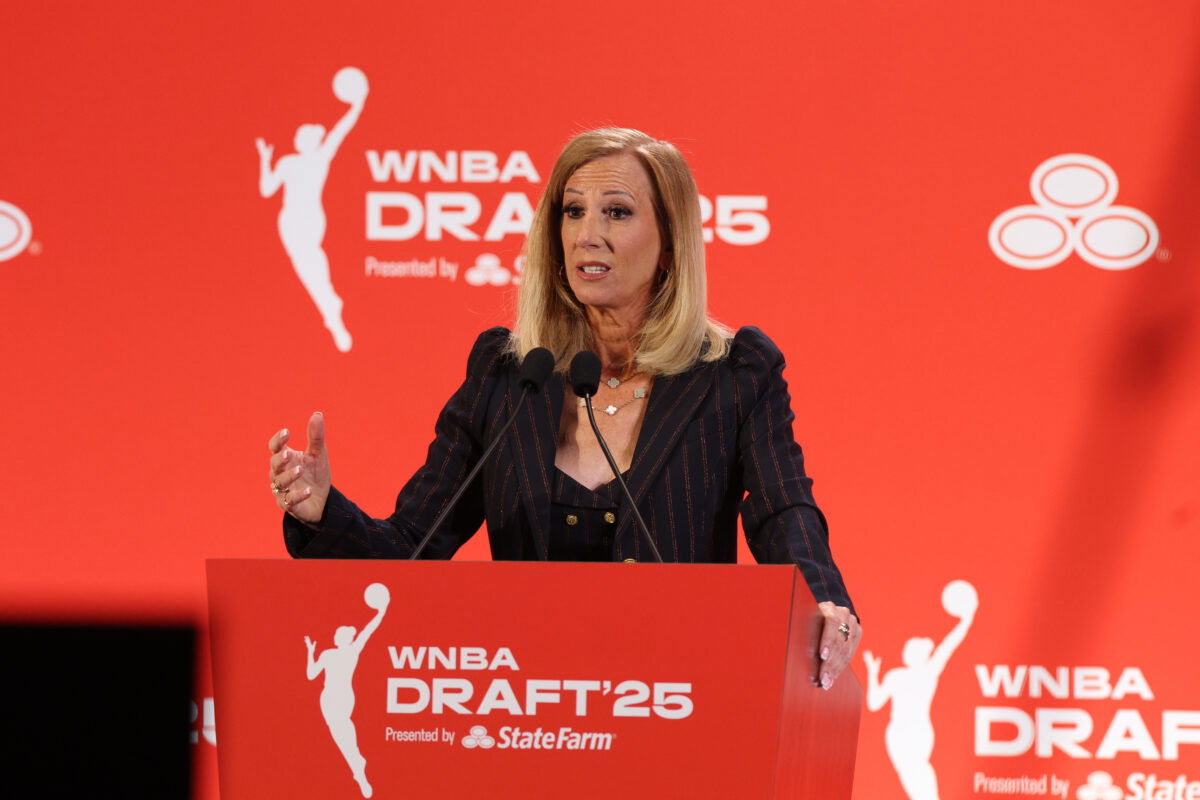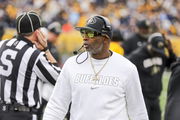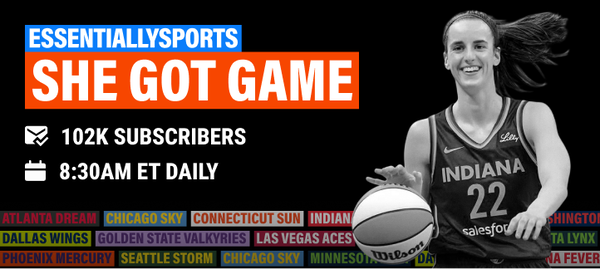
Imago
Apr 14, 2025; New York, New York, USA; WNBA commissioner Cathy Engelbert talks to the media before the 2025 WNBA Draft at The Shed at Hudson Yards. Mandatory Credit: Vincent Carchietta-Imagn Images

Imago
Apr 14, 2025; New York, New York, USA; WNBA commissioner Cathy Engelbert talks to the media before the 2025 WNBA Draft at The Shed at Hudson Yards. Mandatory Credit: Vincent Carchietta-Imagn Images
Fines have been handed out like candy in 2025 by Cathy Engelbert and Co., with players, coaches, and even team owners feeling as though practicing free speech is a crime. Maybe that’s why Las Vegas Aces owner Mark Davis has stayed quiet for so long, despite having turned a $2 million purchase in 2021 into a franchise now worth $310 million. But with the Aces crowned WNBA champions and the CBA deadline closing in, Davis finally has a message for Engelbert on how to navigate the negotiations ahead.
Watch What’s Trending Now!
“The last time I spoke about things like that, I got fined. So, I think it’s better if I think it’s better if I don’t say anything. I think they’ll work it out somehow. I hope; I haven’t been consulted, and I think it’s again, you know what side of the table I’d probably be sitting on. So we’ll get it right, and I think I don’t think that there are two sides to this. If we look at it as togetherness and trying to make the future better, I think that’s what we need to do. We’ll see if that works,” he said at the Aces’ Postgame Presser.
The current CBA was signed in January 2020 and was originally set to run through 2027. However, the WNBPA’s decision to opt out early moved the expiration to October 31 this year. So, the reparations need to happen fast. And while Davis is finally speaking out about CBA now, his comment about being fined wasn’t an exaggeration.
ADVERTISEMENT
Back in 2023, the Aces’ owner landed in hot water after the league opened an investigation into alleged “under-the-table payment offers” to players, a move the WNBA viewed as a possible attempt to circumvent the salary cap. The idea, according to reports, was to help players earn more through sponsorship-style deals funded by outside companies after contract talks concluded, effectively trying to supplement salaries beyond what the CBA allowed.
“I’ve always said we need to invest in these women the way they deserve,” Davis said back then, defending his approach. “I’m going to do everything within the rules, and if possible, around them, to make this team and this league better.” He backed those words with actions: hiring Becky Hammon on a $1 million annual deal (nearly the size of the team’s salary cap), building an 80,000-square-foot practice facility in Henderson, and even buying out middle seats on commercial flights during the pandemic so players didn’t have to sit elbow-to-elbow with strangers.
These were steps he believed the league needed to take to grow. So when Davis now says, “you know what side of the table I’d probably be sitting on,” it isn’t hard to decode. Engelbert, on the other hand, is currently unpopular to say the least.
ADVERTISEMENT
When the commissioner stepped up to crown the Las Vegas Aces as 2025 WNBA champions, fans drowned her words in a wave of relentless boos. The jeering only grew louder as she presented the Finals MVP trophy to A’ja Wilson. Aces players barely acknowledged her presence on stage, and Engelbert quietly left the court as the celebrations roared on and ESPN’s Holly Rowe took over the interview with Wilson. Even then, the boos chased her out.
Well, all this wasn’t really shocking. Engelbert has never really connected with the players’ side of things. “She’s not a people person,” said a source familiar with Engelbert in the Sports Business Journal report. “That’s not who she is. It has been an issue [before CBA negotiations].”
ADVERTISEMENT
She has, however, committed to changing things: “If the players in the W don’t feel appreciated and valued by the league, then we have to do better and I have to do better,” Engelbert said. “If they don’t feel that (appreciation), then I will do everything I can to change that. No one should ever doubt how deeply I care about this league, this game and every single player who makes the WNBA what it is.”
However, at this point, only actions will convince the fans and the players. While Davis called for unity and a shared vision for the league’s future, Engelbert’s previous business decisions, particularly her 2022 investment strategy, now stand as central points of contention shaping the current negotiations.
ADVERTISEMENT
Cathy Engelbert’s 2022 Gamble Could Come Back to Haunt Her
Giving the player the equity they need is more complicated for Cathy Engelbert and the WNBA, since the league does not completely own itself. For years, the NBA has had a 42% stake in the league, and the league had 58% until 2022. Engelbert raised $75 million for a 16% stake from outside investors.
According to the league announcement, “Proceeds from this transaction are expected to be used for brand elevation and marketing; globalization of the WNBA; innovation, digital, and growth of consumer touchpoints; and human capital and operational optimization as part of an overall effort to address some of the league’s obstacles to growth and generating new revenue.”
Top Stories
Cowboys Legend Deion Sanders Announces NFL Boycott After 32 Franchises Disrespect Son Shedeur Sanders

5 Biggest Names to Miss the Cut at WM Phoenix Open 2026

Team USA Overturn Milan Decision to Bring in Ilia Malinin as Team Gold on Stake

Rickie Fowler Admits to Battling Worrying Health Condition Amid Golf Return: ‘On Pain Meds All Year’

Patrick Mahomes’ Dad Faces 10-Year Prison Sentence After Chiefs QB’s Father Reportedly Violated Probation Terms

Multiple PGA Tour Pros Stopped from Playing as WM Phoenix Open Round Is Canceled Over Recurring Problem


Imago
(AP Photo/John Locher)
But we haven’t seen where the money was invested, and the league hasn’t given any explanation. It’s a similar problem regarding the rest of their financials. They haven’t shown the actual numbers to the players in the CBA negotiations. However, $75 million has undervalued the league’s growth.
ADVERTISEMENT
According to Forbes and Sportico, the average valuation of a WNBA team in 2025 is around $269 million, with the total touching $3.5 billion. The 2022 deal valued it at just $1 billion. According to Front Office Sports, that deal was a “costly mistake” for Engelbert.”
That isn’t the only deal Cathy Engelbert has undervalued. The media rights deal starting next year is looking the same after just a year. Now, the president needs equity to provide for its players. Currently, they get only 9.3% of all their basketball income as opposed to 51% in the NBA. The players are just asking for what they deserve.
ADVERTISEMENT
ADVERTISEMENT
ADVERTISEMENT
ADVERTISEMENT
